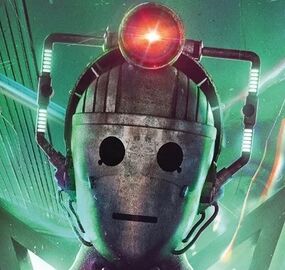Dieter Jovanovic: Difference between revisions
(Created page with "{{Infobox Individual |main alias = |image = |species = Human |origin = Earth, Germany |father = Dieter Jovanovic's...") Tag: 2017 source edit |
m (Bot: Cosmetic changes) |
||
| (3 intermediate revisions by 3 users not shown) | |||
| Line 8: | Line 8: | ||
|voice actor = Peter Bankole | |voice actor = Peter Bankole | ||
}} | }} | ||
'''{{PAGENAME}}''' was a [[Germany|German]] man from [[Berlin]] during the time of the [[ | '''{{PAGENAME}}''' was a [[Germany|German]] man from [[Berlin]] during the time of the [[Weimar Republic]]. | ||
Jovanovic lost [[Dieter Jovanovic's father|his father]] and many [[Friendship|friends]] during the [[World War I|First World War]]. Already shaken by their | Jovanovic lost [[Dieter Jovanovic's father|his father]] and many [[Friendship|friends]] during the [[World War I|First World War]]. Already shaken by their [[death]]s, he was further embittered by the [[Treaty of Versailles|peace settlement]] demanding Germany pay reparations which strangled much of the country into poverty. | ||
In [[August]] [[1925]], Jovanovic encountered a [[Cyberman (Monsters in Metropolis)|lost Cyberman]] and gained control over its actions. He used it to infiltrate the [[film]] set of [[Fritz Lang]]'s ''[[Metropolis (film)|Metropolis]]'' by passing it off as an advanced [[puppet]] that could play the film's [[robot]]. Jovanovic was intent on ceasing production completely because the film was to promote a message of [[peace]], even though the current peace experienced by Germany was a humiliation. Instead, he believed that Germany's only way forward was [[revenge]]. | In [[August]] [[1925]], Jovanovic encountered a [[Cyberman (Monsters in Metropolis)|lost Cyberman]] and gained control over its actions. He used it to infiltrate the [[film]] set of [[Fritz Lang]]'s ''[[Metropolis (film)|Metropolis]]'' by passing it off as an advanced [[puppet]] that could play the film's [[robot]]. Jovanovic was intent on ceasing production completely because the film was to promote a message of [[peace]], even though the current peace experienced by Germany was a humiliation. Instead, he believed that Germany's only way forward was [[revenge]]. | ||
Jovanovic had the Cyberman [[murder]] the film's lead, [[Olaf Richter]], and attack Lang, his assistant [[Anna Dreyfus]], and the [[Ninth Doctor]]. However, with the Cyberman damaged, the Doctor helped it resist its [[Cyberman]] conditioning. It broke free of Jovanovic's control and [[Strangulation|strangled]] him to the point of unconciousness. He was | [[File:Cyberman (Monsters in Metropolis).jpg|left|thumb|The [[Cyberman (Monsters in Metropolis)|Cyberman]] found by Jovanovic. ([[AUDIO]]: ''[[Monsters in Metropolis (audio story)|Monsters in Metropolis]]'')]] | ||
Jovanovic had the Cyberman [[murder]] the film's lead, [[Olaf Richter]], and attack Lang, his assistant [[Anna Dreyfus]], and the [[Ninth Doctor]]. However, with the Cyberman damaged, the Doctor helped it resist its [[Cyberman]] conditioning. It broke free of Jovanovic's control and [[Strangulation|strangled]] him to the point of unconciousness. He was subsequently [[arrest]]ed and confessed to his [[crime]]s. | |||
Despite his arrest, the Ninth Doctor lamented that a growing number of Germans held the same beliefs as Jovanovic, all falling prey to a "[[Nazi|bug]]" | Despite his arrest, the Ninth Doctor lamented that a growing number of Germans held the same beliefs as Jovanovic, all falling prey to a "[[Nazi|bug]]" destined to bring about [[World War II|terrible future events]]. ''Metropolis'' was also a huge [[cinema]]tic failure with contemporary audiences, and its message of peace failed to resonate. It would only be residcovered and re-evaluated [[decade]]s after release. ([[AUDIO]]: ''[[Monsters in Metropolis (audio story)|Monsters in Metropolis]]'') | ||
{{NameSort}} | {{NameSort}} | ||
[[Category:20th century individuals]] | [[Category:20th century individuals]] | ||
[[Category:Human murderers]] | [[Category:Human murderers]] | ||
Latest revision as of 10:24, 18 March 2023
Dieter Jovanovic was a German man from Berlin during the time of the Weimar Republic.
Jovanovic lost his father and many friends during the First World War. Already shaken by their deaths, he was further embittered by the peace settlement demanding Germany pay reparations which strangled much of the country into poverty.
In August 1925, Jovanovic encountered a lost Cyberman and gained control over its actions. He used it to infiltrate the film set of Fritz Lang's Metropolis by passing it off as an advanced puppet that could play the film's robot. Jovanovic was intent on ceasing production completely because the film was to promote a message of peace, even though the current peace experienced by Germany was a humiliation. Instead, he believed that Germany's only way forward was revenge.
Jovanovic had the Cyberman murder the film's lead, Olaf Richter, and attack Lang, his assistant Anna Dreyfus, and the Ninth Doctor. However, with the Cyberman damaged, the Doctor helped it resist its Cyberman conditioning. It broke free of Jovanovic's control and strangled him to the point of unconciousness. He was subsequently arrested and confessed to his crimes.
Despite his arrest, the Ninth Doctor lamented that a growing number of Germans held the same beliefs as Jovanovic, all falling prey to a "bug" destined to bring about terrible future events. Metropolis was also a huge cinematic failure with contemporary audiences, and its message of peace failed to resonate. It would only be residcovered and re-evaluated decades after release. (AUDIO: Monsters in Metropolis)

